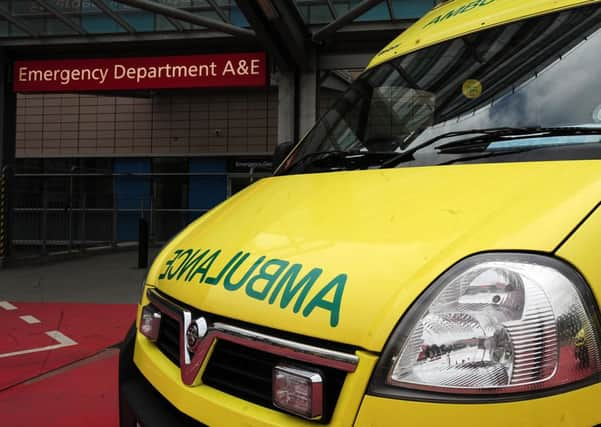NHS IN CRISIS: Paramedics recruited from abroad as more quit ambulance service


The North West Ambulance Service has turned to places including Poland and Finland in a bid to fill posts but union bosses say staff working alongside paramedics want to be trained for the role.
Because training for the job is centred around university courses, unions say ‘demand is outstripping supply’ which they claim hasn’t been planned for and they want training to be brought back in house.
Advertisement
Hide AdAdvertisement
Hide AdIt is understand there are currently around 60 paramedic vacancies within the service, which follows a year-on-year increase in the number of people leaving the job.
Today Ambulance chiefs said international recruitment was “not unusual” and training routes are “being developed” for staff.
Bob Parkinson, branch secretary of Unite at NWAS said: “I have no problem with NWAS recruiting paramedics from abroad.
“I am angry that the planning for recruitment of paramedics has been woefully bad. We are angry that yet again the forward planning of NWAS is woeful.
Advertisement
Hide AdAdvertisement
Hide Ad“We are now in a recruitment situation where we are scouring the planet for paramedics and we have a workforce who want to be trained for the role.
“Our staff are concerned that we appear to be stumbling from one crisis to another.
“I believe it is yet again poor forward planning of a trust that just reacts.”
Mr Parkinson said emergency medical technicians who work alongside paramedics are “desperate” to be paramedics but discussion on how they can be trained only started recently - which he said is “too little too late.”
Advertisement
Hide AdAdvertisement
Hide AdHe added: “We have always questioned whether there would be an ability for us to get back to doing our own training.”
It comes as figures show the percentage of paramedics leaving has risen from 5.75 per cent last year to 7.3 per cent.
He added: “The retention for paramedics has always been very good but the constant increase in the pressure of the role, we believe is leading to paramedics looking for alternative employment within the medical profession, but not the ambulance service.”
Meanwhile Steve Rice, GMB Branch Secretary, said: “The real issue, the crux of this is we used to be trained internally. I went from being an ambulance man to a technician to paramedic.
Advertisement
Hide AdAdvertisement
Hide Ad“Now they have moved away from that. It is making it a much lengthier process to fill vacancies which is why they are looking elsewhere.
“I have no issue with people coming from abroad.
“If you have a busy year, the funding (for positions) goes up - but there’s no one in reserve so they have started looking to other countries.
He added: “The number of people leaving has almost doubled, there’s an awful lot of staff leaving.”
A spokesman for the North West Ambulance Service said: “We are exploring options around international recruitment which is not an unusual approach to filling shortage occupations within the NHS. We are primarily considering recruitment from within the EU.
Advertisement
Hide AdAdvertisement
Hide Ad“We are predicting to have around 60 paramedic vacancies at the end of the financial year but we have also seen increases in turnover which mean that we need to plan to address potential shortfalls.
“None have been actively recruited internationally but we have had a small number of individuals who have applied independently for advertised vacancies to the trust.
The spokesman added: “The move to higher education happened nationally as a result of the role of paramedic becoming a registered profession and the criteria for registration was of a higher educational level than previously.
“This is in the best interests of the patient as it enables higher levels of clinical care to be provided.
Advertisement
Hide AdAdvertisement
Hide Ad“The Trust works closely with Health Education North West to plan our future supply of paramedics, but there have been a number of external factors which have affected that planning.
“Unexpected increases in turnover have been seen across the country because paramedics are a flexible and effective resource and this is now being recognised in other parts of the health and private sector, creating additional opportunities which were not previously available. “Alongside this growth, the ambulance sector has seen significant increases in their own activity which was higher than planned.
“The North West is, however, in a much better position than other parts of the ambulance sector because of effective planning in previous years.
“Our workforce planning takes account of those existing employees that we are training and the students who are training in our partner universities.
Advertisement
Hide AdAdvertisement
Hide Ad“We are also looking at all opportunities to maximise UK recruitment. International recruitment will only be used to help bridge any remaining gaps.”
“Our turnover (increased) from 5.75 per cent to 7.3 per cent in the last 12 months.
“The main reason for this is the increased level of opportunities elsewhere for paramedics, both here and abroad, and there are no indications of an increase as a result of ill health.”
Addressing training for Emergency Medical Technicians to become paramedics, the spokesman said: “We have two closed grades of staff, all of whom have been offered the opportunity to progress to become paramedics and we expect to be able to meet those expectation during the next two years.
Advertisement
Hide AdAdvertisement
Hide Ad“We have agreed increased numbers of training places to achieve this and the trade unions asked us to give priority to these groups of staff.
“At the same time we are working with Health Education North West to develop training routes for Emergency Medical Technicians.
“There is currently a pilot course running and we hope to be able to offer this route from next year.”